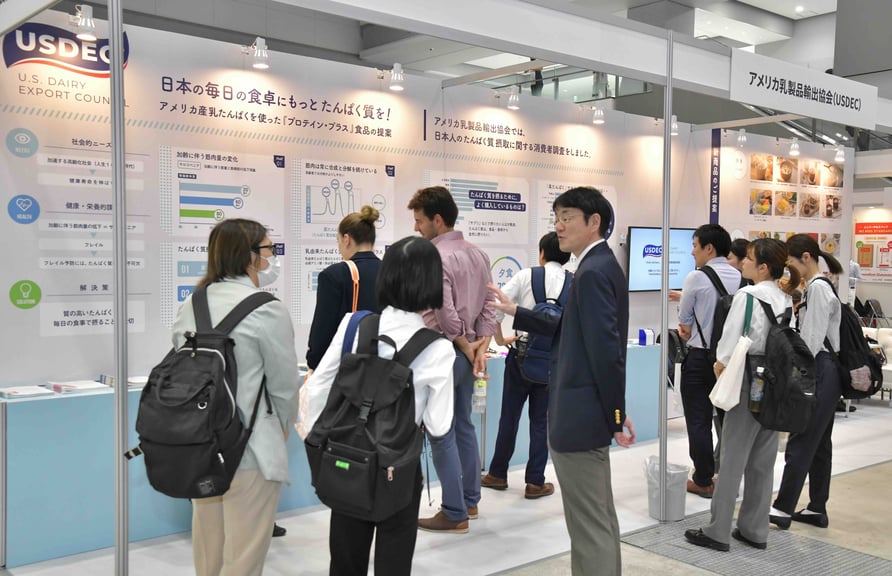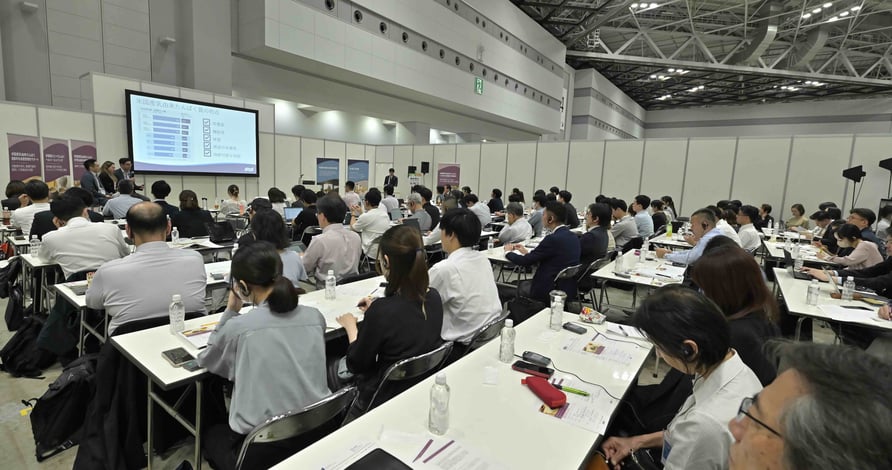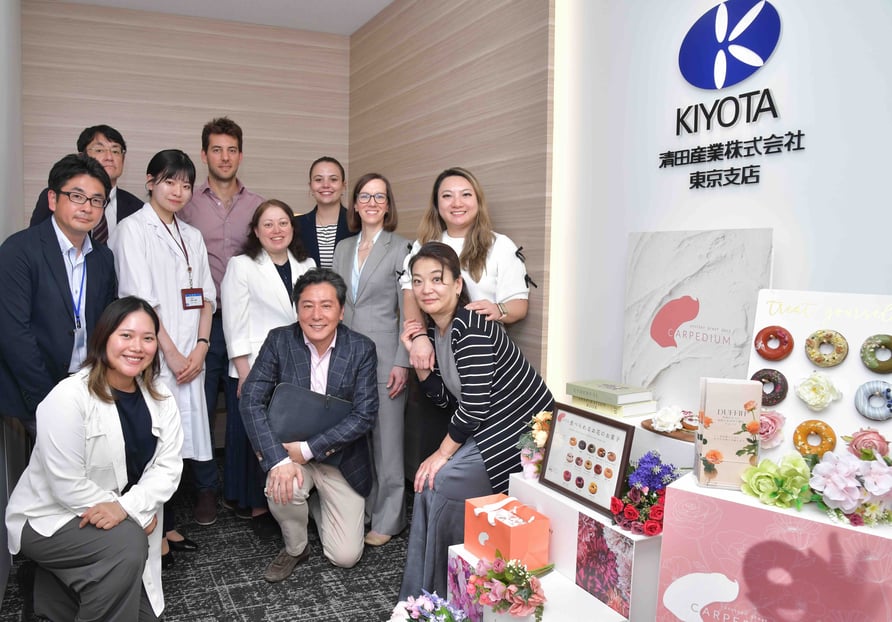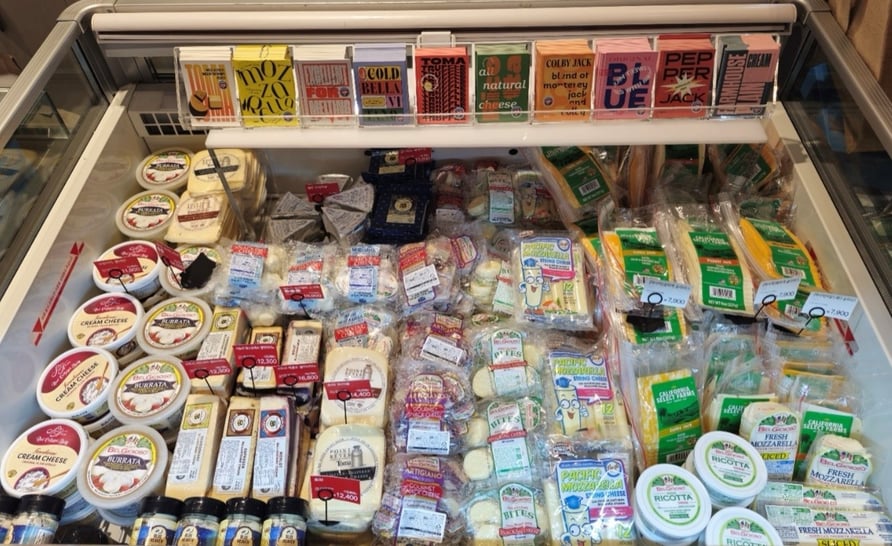HIGHLIGHTS: May 31, 2024
• Three activities highlight U.S. dairy protein potential in Japan
• Cyber security alert: member action advised
• U.S. cheese pop-ups open at three Korean Hyundai stores
• FMC detention and demurrage rules enters into effect
• Addressing the issue of container break-ins
• House Ag Committee clears farm bill
• World Milk Day activities in Mexico, Central America
• MARA training webinar for members: new detained shipment form; Export Guide
• Market Summary: April China dairy imports
• New EU farmer protests
• USDA releases Dairy and Products Semi-Annuals
• Valio expands cheese plant
• Company briefs: Fonterra, Danone, Sabelli, Anchor Food
Featured
Trio of activities boosts U.S. dairy ingredient profile in Japan
A series of USDEC activities last week in Japan provided insights on Japanese market opportunities to U.S. suppliers and drove home messages on the many advantages of U.S. dairy proteins to a broad audience of Japanese food and beverage industries. The activities came as protein-added mainstream products for health-inclined consumers are gaining momentum in Japan.
IFIA show and conference
From May 22-24, USDEC exhibited at the International Food Ingredients & Additives Exhibition and Conference (IFIA) in Tokyo, the largest functional food, ingredients and additives trade show in Japan. USDEC’s booth showcased U.S. dairy protein nutrition and innovation advantages and how they can deliver on Japanese demand for health-and-wellness foods and beverages.
Photos and descriptions of 20 prototype products developed through USDEC’s innovation partnership with Japanese consultancy Kiyota Sangyo lined the booth walls.
“Staff could walk show attendees through the booth and explain how each of the products fit typical Japanese dietary habits and consumer needs throughout the day, highlighting eating occasions that were ripe for new product innovation, such as where protein consumption tends to be lowest,” said Kristi Saitama, USDEC vice president, Global Ingredients Marketing.
To really bring home the potential of U.S. dairy protein, show attendees were treated to three of the Japan-friendly prototypes made with U.S. whey and milk proteins: 1) “furikake,” a rice topper seasoning made with U.S. WPI; 2) “dorayaki,” a traditional Japanese sweet made with WPI and MPC80; and 3) ready-to-mix strawberry flavored instant yogurt made with WPC80.
A video panel in the booth alternated between showing a video on Japanese consumer perceptions of protein and U.S. dairy farmers sharing their own dairy farming, sustainability and stewardship stories. (Click here to watch the English version of the three-minute video “Japan Protein Perspectives.”)

USDEC staff working the IFIA booth indicated traffic was strong and visitors showed serious interest, taking time to diligently read the booth panel information and fill in USDEC survey forms.
USDEC protein-innovation seminar
On the second day of IFIA, USDEC hosted the U.S. dairy protein innovation trade seminar, “U.S. Dairy Industry 3.0—Evolving Protein Ingredient Capacity and Future Horizons for New Product Innovation.” A series of presenters highlighted U.S. dairy protein advantages to a packed room of over 80 importers and R&D and management staff of health-and-wellness-focused food and beverage manufacturers.
Among the highlights, a panel of three U.S. dairy suppliers—Jing Hagert, vice president of human nutrition, Milk Specialties Global, and chair of the USDEC Ingredients Advisory Group; Yoshihiro Shigeta, representative managing director, Glanbia Japan; and Andrew Sullivan, vice president, international sales, DairyAmerica—discussed the United States’ evolving dairy ingredient product portfolio. The panel outlined the nutritional quality advantages of U.S. dairy proteins versus alternative non-dairy protein sources, noting that U.S. dairy proteins offer “the complete package” of nutrition, functionality, sensory benefits, versatility and sustainable supply.
In addition, Kiyota Sangyo’s Yusura Ozaki highlighted Japan-friendly innovation opportunities with U.S. dairy proteins and unveiled samples of newly created USDEC prototypes for attendees to taste, including protein rice and egg congee made with WPI, a protein pudding made with WPC80 and featuring double the protein of typical pudding, and the custard cream portion of a cream puff made with U.S. WPI, WPC80 and MPC80.
USDEC Japan's Director General, Hisao Fukuda, reinforced the U.S. dairy industry’s unique strengths and advantages to deliver on customers’ diverse needs, and USDEC's Saitama and Annie Bienvenue, vice president, Global Ingredients Technical Marketing Services, shared innovative U.S. dairy protein prototype concepts from China, Southeast Asia and Korea.

The U.S. supplier panel at the U.S. dairy protein innovation seminar highlighted U.S. capacity and why U.S.-origin dairy proteins and ingredients are ideal and advantageous for customers.
Kiyota Sangyo collaboration visit
On May 22, USDEC Arlington and representatives from member companies DairyAmerica, Milk Specialties Global and T.C. Jacoby & Co. attended an educational briefing on health and wellness market opportunities in Japan. The latter two companies also visited Kiyota Sangyo’s branch office in Tokyo on May 24 to taste prototypes made with U.S. dairy protein.
The Kiyota Sangyo portion of the day provided a valuable opportunity for robust information exchange between Milk Specialties Global, T.C. Jacoby, USDEC and Kiyota Sangyo to inform future prototype creation.
The educational briefing laid out the growth potential for dairy proteins in Japan. The protein market in Japan (all proteins, not just dairy) has been growing rapidly, and the country is the most advanced in Asia. However, Japan is still in the early phase of development compared to Western markets.
Joe Tanaka, country manager–Japan, Innova Market Insights, pointed out that “high-in”/“source of” protein claims in total food and beverage launches in Japan was just 2.3% in 2023. That compares to a global average of 6.3% and the U.S. total of 10.9%.
“Tanaka’s presentation reinforced that the U.S. dairy industry is just scratching the surface of protein opportunities in Japan with considerable upside potential,” said Saitama.

Left to right: Jing Hagert of Milk Specialties Global and Tristan Suellentrop and Diego Carvallo of T.C. Jacoby learn about and sample Japan-friendly U.S. dairy protein prototypes at Kiyota Sango offices.

USDEC staff, members and Kiyota Sangyo representatives at the company’s office in Tokyo.
Cyber security and dairy: important action steps
USDEC and NMPF staff met with USDA earlier this month to discuss the importance of heightened vigilance by the food and agriculture industry against cyber security attacks. In particular, USDA highlighted the recent alert issued jointly by multiple agencies entitled “Defending OT [Operational Technology] Operations Against Ongoing Pro-Russia Hacktivist Activity,” which touched on cyber threats to food and agriculture sectors and steps to take to mitigate the risk of attack. Operational Technology is hardware and software that detects or causes a change through the direct monitoring and/or control of industrial equipment, assets, processes and events.
USDEC urges its members to read the alert and take steps to disseminate the information throughout their operations.
The fact sheet noted, “The authoring organizations are aware of pro-Russia hacktivists targeting and compromising small-scale OT systems in North American and European Water and Wastewater Systems (WWS), Dams, Energy, and Food and Agriculture Sectors. These hacktivists seek to compromise modular, internet-exposed industrial control systems (ICS) through their software components, such as human machine interfaces (HMIs), by exploiting virtual network computing (VNC) remote access software and default passwords… [H]acktivists have been observed gaining remote access via a combination of exploiting publicly exposed internet-facing connections and outdated VNC software, as well as using the HMIs’ factory default passwords and weak passwords without multifactor authentication.”
The alert offered three immediate steps that the targeted sectors (which includes food and agriculture) should take immediately to protect themselves, as well as additional recommended ways to mitigate the risk of cyber attacks on operational technologies. Those steps are:
- Immediately change all default passwords of OT devices (including PLCs and HMIs), and use strong, unique passwords.
- Limit exposure of OT systems to the internet.
- Implement multifactor authentication for all access to the OT network.
USDEC and NMPF view these recommendations as particularly important for dairy farms and facilities to implement.
Korea’s Hyundai Department Store hosts U.S. cheese pop-up
The results from this month’s pop-up USA cheese promotion at a Seoul Hyundai Department Store were so strong that the company has committed to two additional pop-ups in the near future.
The success of the promotion did not happen overnight but was built on USDEC's cheese programs over the past few years, which aimed to educate both consumers and retailers about U.S. cheese quality, flavors and uses. As in many global markets, a key goal of USDEC is to demonstrate that the United States offers more than just commodity cheeses like cream cheese and processed cheese.
Building on the past
In 2023, the Cheese team initiated promotional events with Hyundai to expand the variety and raise awareness of U.S. cheese. That led to the registration of 33 new U.S. cheese products in the store’s purchasing system, more than doubling the pre-promotion number.
Earlier this year, 14 Hyundai staff graduated from the USA Cheese Specialist™ Certification Program for Retail Professionals. That training and the success of the previous promotion encouraged the chain to commit to this year’s pop-up.
An ideal cheese venue
Hyundai is an ideal outlet to reach high-potential buyers. The store boasts the largest selection of cheese among brick-and-mortar retailers in Korea. Its patrons have a strong affinity for cheeses and possess a high level of cheese knowledge.
But even with the training and past success, the retailer was hesitant to order the new cheese products. The USDEC Korea office staff worked with Hyundai to convince them to order six U.S. brands that had not been previously sold.
The pop-up ran at the Apgujeong branch in Seoul from May 17-23. To provide customers with information about the cheeses, 10 cheese varieties and recipe cards were displayed by the cheeses in the pop-up. Additionally, customers who spent more than $50 were given cheese bags and picnic bags to further entice sales. The cheese tastings also helped attract more than 300 customers per day.
The point-of-sale marketing, giveaways and tastings added up to a 400%+ increase in sales for the six days of the promotion.

Korean shoppers gather to sample U.S. cheese at the pop-up U.S. cheese promotion at the Hyundai Department Store in Seoul’s Apgujeong upscale shopping district.

Information cards lined up above the USA Cheese case provide insights on cheese tastes and applications.
FMC detention and demurrage billing rule goes into effect
The Federal Maritime Commission’s (FMC’s) final rule on detention and demurrage billing practices went into effect on May 28. The rule, which is part of the Ocean Shipping Reform Act (OSRA), addresses lingering challenges U.S. exporters have faced with unfair and improper charges even after the supply chain crisis subsided.
USDEC submitted comments backing the draft rule in December 2022, suggesting some refinements to clarify the provisions. The final rule largely aligns with those comments on key matters, such as providing clarity on who should be billed, the timeframe for billing and the dispute process.
The rules should benefit U.S. dairy suppliers by providing greater supply chain transparency and cost certainty.
USDEC continues efforts to address container break-ins
USDEC’s Tony Rice, director, Trade Policy, joined a coalition of parcel carriers and supply chain service providers this week in a meeting with Homeland Security Investigations (HSI) regarding the container break-in issue. USDEC is working with the coalition to advance appropriations language that dedicates funding for an HSI taskforce focused on the organized retail crime groups that are breaking into intermodal containers in transit. Dairy exports and other agricultural goods are increasingly becoming collateral damage as criminal groups indiscriminately break into containers in search of high-value retail goods.
USDEC continues to seek solutions to the problem and gather member input from any dairy supplier who has experienced container break-ins. Last week at the Agriculture Transportation Coalition (AgTC) 36th Annual Meeting, Rice gleaned best practices to mitigate the cargo pilferage for intermodal rail shipments out of the Midwest destined for West Coast ports. USDEC asks any members who have had break-ins to contact Tony Rice at trice@usdec.org for additional information.
House Ag Committee advances farm bill
The House Agriculture Committee passed its version of the 2024 farm bill last Friday. As noted in the May 17 Global Dairy eBrief, it contains three key dairy trade priorities: the Safeguarding American Value-added Exports (SAVE) Act; doubled funding for the Foreign Market Development (FMD) and Market Access Program (MAP) programs; and a rebalancing of international food aid authority between the U.S. Agency for International Development (USAID) and USDA. Timing for a vote in the full House of Representatives is uncertain.
USDEC celebrates World Milk Day in Latin America
USDEC organized special activities in Mexico and Central America this week to promote the benefits of dairy consumption on World Milk Day while raising the profile of U.S. dairy in key partner markets. World Milk Day was established in 2001 by the Food and Agriculture Organization (FAO) of the United Nations to recognize the importance of milk as a global food. Held annually on June 1, World Milk Day celebrates the global dairy sector. USDEC works with local partners in Latin America every year to educate and build demand for dairy.
This year, USDEC worked with the Mexican dairy sector (including Canilec, AMLAC, CNOG and large dairy companies) to launch a special May 31 supplement in the Reforma newspaper (print and digital) focused on milk and dairy products. USDEC placed a full-color ad to celebrate World Milk Day. The supplement contained information about benefits of consuming milk and dairy, and all of the participating groups will publish generic ads promoting milk consumption.
In addition, on Thursday, Edgar Garcia from the USDEC Mexico team presented at a dairy conference of academia, dairy companies and influencers in Guatemala City, highlighting the nutritional benefits of dairy consumption. The conference included a mini trade show (where USDEC had a booth) and was organized by Guatemalan dairy group Gremial de Lácteos y Derivados.
Events
USDEC MARA team invites members to join training webinar for new detained shipment form, Export Guide
USDEC’s Market Access and Regulatory Affairs (MARA) team will conduct a one-hour training webinar on Tuesday, June 11, starting at 3:00 p.m. ET/noon PT. The webinar will include a demonstration of the new Detained Shipment Form, a template that USDEC members can complete to request assistance from the MARA team if a shipment is stuck at port.
In addition, the MARA team will review how to navigate the Export Guide, USDEC’s members-only resource with information on tariffs, import requirements, compositional standards and labeling requirements. This training presents a great opportunity for new staff to learn more about USDEC resources and also serves as a refresher for more experienced staff.
Registration is open to USDEC processor and trader members. Click here to register. If you have any questions, please contact Jessica Smith at jsmith@usdec.org.
Market Summary
Chinese dairy imports continue to disappoint
Despite a rebound in cheese and butter purchases and ongoing strong WPC80+ demand, year-over-year (YOY) Chinese dairy imports (from all sources) fell for the third straight month in April. Milk powder (particularly SMP) and low-protein whey remained in the doldrums, and lactose declined for the second straight month.
While dairy farm margins have been tightening for some months in China, increased domestic milk production, milk powder inventories and economic uncertainty continue to undercut import demand growth.
Select growth categories
On the plus side, YOY cheese imports jumped 23% (+3,035 MT) to an April record of 16,071 MT. New Zealand and Australia were the biggest beneficiaries, with combined volume for the month up 21% (1,929 MT). Cheese imports from the U.S. fell 32% (-386 MT) in April.
Month-to-month, Chinese cheese imports have been inconsistent in 2024, with two gains and two declines, and they are up 3% year-to-date.
After a rough start to the year in January (YOY -22%), WPC80+ imports increased for the third straight month, rising 11% (+290 MT). The United States is the largest WPC80+ supplier to China; imports from the U.S. rose 2% (+24 MT) for the month.
Major products still weak
Milk powder—particularly SMP—is showing no signs of recovery. YOY SMP imports fell 37% (-12,725 MT) and were down 31% (-45,079 MT) through the first four months. WMP dropped 9% but remained up 3% (-3,633 MT) year-to-date based on a strong January.
New Zealand WMP and SMP exports to China in April (an indicator of subsequent-month Chinese imports due to the shipping and recording lag times) were down 38% and 40%, respectively. That suggests a long-awaited rebound in Chinese milk powder imports is unlikely in May.
Economic forecast rises
China’s stronger-than-expected first quarter economic results (+5.3% growth) and recent new economic support measures caused the International Monetary Fund (IMF) to lift its economic forecast for the region by 0.4 percentage points for 2024 and 2025. IMF now expects China’s economy to expand 5% this year and 4.5% in 2025.
The revised growth projection is positive news for dairy consumption prospects. However, the IMF also noted that significant downside risks remain, including the ongoing property crisis and an insufficient social safety net that is limiting consumer spending.
EU dairy farmers organize new protest
A coalition of dairy farmers from more than 15 EU countries gathered in Brussels this week to launch new protests under slogan, “Fair Income for Farmers, Now!” The farmers planned the protest to coincide with a meeting of the bloc’s Agriculture and Fisheries Council, and just prior to World Milk Day and EU elections in two weeks.
The coalition presented a list of seven demands, including an EU-wide regulation that prohibits prices that do not cover production costs, more input from farmers in the design and implementation of Green Deal agricultural policies, and clauses that ensure any imported food and feedstuffs comply with EU requirements.
This week’s dairy-only protests were not nearly as large as agriculture protests throughout the first quarter of 2024. Those previous, broader-based blockades and rallies secured concessions from the bloc (some of which are still uncertain) on Common Agricultural Policy requirements and the EU’s impending Green Deal “Farm to Fork” regulations. (Agri-Land, 5/27/24; Euronews, 5/27/24; The Brussels Times, 5/26/24)
USDA releases dairy semi-annuals
This week, USDA released additional 2024 Dairy and Products Semi-Annuals. At press time, the agency had released a total of five (click on the respective names to download): Australia, China, the EU, Mexico and New Zealand.
Company News
Valio investing more than €60m in Finnish cheese plant
Finland-based Valio is investing more than €60 million (about US$65.2 million) to enhance its cheese production plant in Lapinlahti. The investment includes adding about 22,000 square feet to its existing facilities, replacing outdated manufacturing equipment, renewing packaging operations and equipment, and adding a new power substation and back-up power. Construction on the plant, which is one of Valio’s largest, will begin this summer, with the enhanced operations to begin in spring of 2026. (Company reports)
Anlene Indonesia debuts adult milk powder infused with medicinal seed
Fonterra Co-operative Group’s Anlene business in Indonesia launched a new adult milk powder containing habbatussauda, a black seed with many purported health benefits that is revered by Muslim consumers. The seed, which is commonly called “black seed” or “black cumin,” has been used medicinally for centuries in Southeast Asia and claims to offer health benefits ranging from heart health and weight loss to boosting memory, fighting inflammation, and treating coughs and colds. The product, called Anlene Gold 5X habbatussauda, was soft launched in more than 2,700 stores across Indonesia during the month of Ramadan, with a formal product launch to follow. (FoodNavigator-Asia, 5/21/24)
Danone makes medical nutrition investment
To meet increasing global demand for medical nutrition, French dairy giant Danone invested €70 million (about US$76 million) in its Steenvoorde production facility in France. The majority of the investment (about US$65 million) will go toward producing roughly 30 recipes of the company’s oral nutritional supplement under its Nutricia specialized nutrition range. The remaining investment will be used for new infrastructure, including a biomass boiler that aims to reduce the site’s carbon footprint by 70%. The site is expected to produce nearly 20 million liters of medical nutrition products per year. (The Manufacturer, 5/23/24)
Mergers, acquisitions and joint ventures
In a move to strategically expand into adjacent segments of the dairy market. Italy-based dairy group Sabelli has acquired fellow Italian cheese producer Stella Bianca from Mila Cooperative. The deal is expected to be completed next month. … Private equity firm Hoffmann Family of Companies (HF Companies) bought Oberweis Dairy and its assets in a bankruptcy auction. The Hoffmann bid beat an initial offer for Oberweis from the owner of dairy and egg marketer Dutch Farms. HF Companies said it did not plan to close the Oberweis processing plant in Aurora, Illinois. (NBC Chicago, 5/30/24; Just Food, 5/24/24)
Company briefs
Japan’s Meiji held an opening ceremony to celebrate the start-up of its new US$90-million ice cream plant in Shanghai (which began commercial production in late March). … Fonterra’s Anchor Food Professionals is switching distributors in China. Effective Aug. 1, the company will partner with Maihi Ltd., a subsidiary of Uni-China Business Group that specializes in food trading and foodservice. Anchor currently works with Sims Trading. The new relationship is expected to further help increase penetration in the Chinese bakery sector. … Yum China signed a cooperation agreement with state-owned China Supply and Trade Group to focus on expansion in lower-tier cities. … Israel-based food tech startup NewMoo has developed a new technology that uses plant molecular farming to produce casein proteins that it claims can be used to create animal-free cheese alternatives. Click here to read more about the innovation and how it differs from current dairy-free production methods. (USDEC China office; FoodBev Media, 5/28/24)
In Case You Missed It...
U.S. Dairy Exporter Blog
Market analysis, research and news subscribe hereUSDEC Twitter feed
Follow us here.